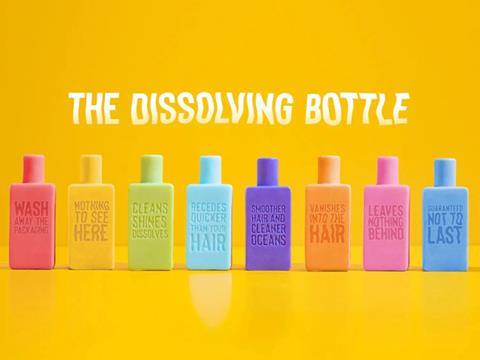
As we have said before, not all Smart Packaging needs a chip, tag, or QR code to ‘connect’ it, or even something in the material or package to make it ‘active’. In 2020, one example was a box containing a Dutch bike which, on the outside, said it was a television – this reduced damage in transit by 40%! In 2021 we saw a fruit pack that contained a daily banana for six days, from ready to eat to a bit green – which prevents the throwing away of a load of over-ripe bananas. To end 2022, we now have the ‘dissolvable shampoo bottle’, which, in fact, is not a bottle at all.
As the original article, which appeared on Dieline, a bespoke creative platform serving the packaging community, says, personal care products like shampoos mostly come in liquid form, primarily for convenience - rather than formats that would require a consumer to spend time lathering up a dry or solid cleanser.
But this convenience comes at an environmental cost, say the authors. The added water is heavy and produces greenhouse gas emissions in transport. Plastic bottles are inexpensive and lightweight, making them the preferred choice for packaging liquid shampoo.
But plastic bottles add to the existing plastic pollution issue. Consumers and designers, concerned with this trade-off between ease of use and environmental damage, are looking at more sustainable ways to get clean without making the planet less ‘green’.
Agency BBDO’s Filipino branch in Guerrero developed this new solid shampoo that is plastic-free and open-source. Additionally, it carries a sustainability message throughout its whole life via a “dissolvable font” that serves as a constant reinforcement of the consumer’s eco-friendly choice. While the dissolving bottles are solid shampoo bars, the familiar bottle shape is intentional and is used to make the sustainable concept more approachable, it says. The messaging endures as the bar is used and grows smaller.
Additionally, BBDO Guererro open-sourced the design and offered the moulds at cost to local artisans to encourage more sustainable soap options. So far, some resorts on Boracay Island, a resort island in the Western Visayas region of the Philippines, have adopted the dissolving bottles.
“Boracay gets thousands of tourists every day,” says Julia Lervik, owner of Diniview Villa Resort, Boracay. “That’s a lot for a small island. When they come here, they fall in love with the beach. They don’t want to see plastic in the crystal-clear waters. The dissolving bottle is a simple solution to keeping our beaches clean while making hotels like ours play a bigger role.
Of course, the concept raises several questions which are not addressed on Dieline. Does the product travel and store well? Does it damage or discolour easily? What are the limits to the formula? After one or two uses does it just become another messy soap bar on the bathroom shelf? For a scalable rollout these issues are important. But as it’s an open-source product, localised production is practical and convenient for some markets.
AIPIA would never want consumers to underestimate the important role packaging plays in the lifecycle of most FMCGs. But we always acknowledge ingenuity and smart thinking. And, after all, the product is a ‘bottle’, so even the creators realise the importance of this in the consumer psyche! Happy New Year!
This article was created in collaboration with AIPIA (the Active and Intelligent Packaging Industry Association). Packaging Europe and AIPIA are joining forces to bring news and commentary about the active and intelligent packaging landscape to a larger audience. To learn more about this partnership, click here.














No comments yet